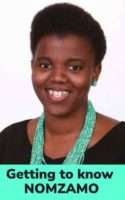Nomzamo Portia Ntombela is a PhD Candidate in Sociology at Stellenbosch University from Durban, Kwa-Zulu Natal. She was also the first black woman student body President at Stellenbosch University in 2017 and continues to be involved in student organising efforts. She holds an MA in African history from Michigan State University, Hons in Social Anthropology and a BA from Stellenbosch University. She has presented various talks and guest lectures, both locally and internationally, on contemporary social justice movements in SA, transitional justice and the history of women’s activism in Africa. Nomzamo also sits on the board of the South African Board of Sociology.
- How did you end up studying Sociology and what does it teach you about the world we live in?
There’s no direct answer to this, but I think I’ve always been interested and intrigued by how people are, how societies are, and how they function. I came into sociology because I was fascinated by theory in my final year of undergraduate studies. I went into anthropology first, then history – and through that, I realised how African and Western theory intersects in our lives. So for my PhD, it made sense to combine all of this and see how it’s embedded into our cultural practices in the everyday life.
- What is your research about and why do you think it’s important?
My research explores the experiences of women in the military. It is important because we are owed an intellectual history of women in exile. Not just the everyday experiences, but about how women contributed to the South African democratic project. I want to argue that if women were taken more seriously, we would have a different iteration of democracy in the country today.
- What do women in leadership mean to you?
I don’t want to be cliche, but women have always been leaders. Women take up space and are steadfast and grounded in what they believe to be right. Being authentic. As a first-gen student, I’ve always occupied leadership willingly or unwillingly, but I turn that pressure into motivation. Being honest with people is also important, with the women who look up to me, who I mentor, and being real about the realities they encounter, while also tapping into networks that can offer them recognition of what they face. In my Honours studies, I looked into sisterhood, and I wanted to look into African sisterhood. This is how I view myself in leadership, helping facilitate these networks across different generations.
- How do you balance the expectations of university and work under pressure from family and society?
For me, I prioritise. In Zulu, there’s a quote that says, “Umsebenzi awupheli, kuphela wena” – which means that the work never ends, but you can. Which sounds morbid, but it’s true.
People’s expectations and tasks are there, but whose voice is most important? It’s not easy, it takes mentorship, and eyes of graciousness onto yourself to become skilled at doing. My mentor always used to say ‘trust your gut’. If you aren’t feeling something, reach out to others wiser than you because we don’t always know or understand everything. Through talking together we trust that we are able to discern what these pressures and expectations are. And how we can meet them as the best version of ourselves.
Tell us: what do you find most interesting or inspiring in Nomzamo’s story?
If you enjoyed this, read about another inspiring woman here.


